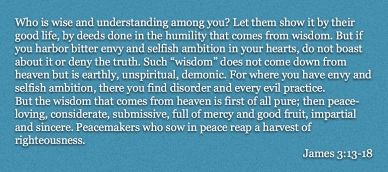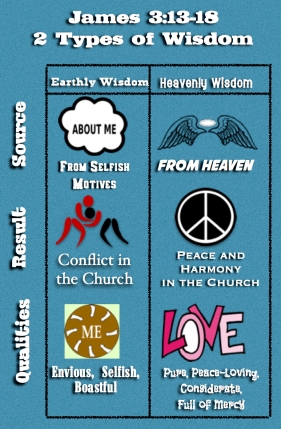
Everyone assumes that they have common sense and are wise. Recently, I have noticed that self-assuredness is incredibly common in our culture. You see it in memes on Facebook, proclamations that the poster has more sense than the rest of the world. Bumper stickers proudly proclaim the driver’s amazing sense compared to the population at large. At the foundation of many arguments and articles is the assumption that the wisdom drives the position of the author, whereas the other political party’s adherents live with their heads in the sand. This self-assuredness, often without reflection, is spoken of in the book of James. James uses the word “wisdom”, rather than common sense, though the concept is similar. Wisdom is knowledge that translates into action.
James 3:13-18 describes two kinds of wisdom: worldly wisdom and wisdom that is from God. These two kinds of wisdom differ in their orientation and in their results. Noting the results of wisdom is important because in the passages preceding, James writes at length about the tongue and how loosely spoken words can create havoc in the church, comparing these loosely spoken words to sparks that ignite a forest fire. Wisdom is the source of the thinking that drives our words. As such, we can look at the result of our spoken words and get a hint as to what sort of wisdom lies behind them.
 Words that create chaos
Words that create chaos can be easily identified because they breed conflict, anger, and infighting in the body of Christ. Words that create chaos and destruction are likely rooted in worldly wisdom.
Words that make peace tend to spread the gospel, and create unity in the body of Christ. These are the sorts of things James points to as coming from words that are steeped in Gods wisdom.
The major focus of verses 13-18 is the source and characteristics of worldly and Godly wisdom.
Worldly wisdom: Wisdom that is worldly is self-centered. James describes this as bitter envy and selfish ambition. Both of these are focused on what the individual wants for themselves and the emotional drives that motivate the individual. If the desire to be right breeds misery and anger over others not recognizing the value, rightness, awesomeness, or importance of you or your words, worldly wisdom is at play. The final component described here is boasting, which is essentially bragging over how smart, sensible, or right you are. Such self-aggrandizing is described as a lie, because it is proclaiming wisdom that isn’t Godly Wisdom. James goes on to describe this sort of wisdom as being essentially the opposite in origin from Godly wisdom. James closes his comments regarding worldly wisdom by pointing out that wherever wisdom is driven by self-interest, you will find sinful behavior and disorder. The fruit of worldly wisdom is chaos.
Heavenly wisdom: Heavenly wisdom is first described as “pure” meaning “not sinful.” If wisdom arises out of any sort of rebellion against God, it isn’t heavenly. He goes on to describe it as peace-loving, considerate, submissive, impartial, and sincere. These qualities essentially point toward heavenly wisdom creating peace and harmony in the body. “Considerate” is best understood as flexible, or not rigid in personal preferences or opinions, something worth considering when a fight breaks out over whether the organ belongs in every song in the worship service. “Submissive” refers to submission to scriptural truth. Wisdom that is Godly essentially takes God’s design as the template for the world. “Impartiality and sincerity” refer to honest, loving treatment of others, regardless of their past, wealth, social status, etc. The final two ways James uses to describe heavenly wisdom are “merciful and full of good fruit.” “Mercy” refers to love for neighbors that translates into action, which consistently produces good fruit.
The final comment James offers on the matter of wisdom is “Peacemakers who sow in peace reap a harvest of righteousness.” Wise people seek peace and plant seeds of peace in the lives of others. The harvest they reap is right relationship with God and their family in Christ.
Self Examination: Earlier in his letter, James urges believers to look at the scriptures as though they were a mirror. We are directed to look at the scriptures and compare our own behavior and life to the ideal. The passage offers a few great pointers regarding what we are to look for in considering whether or not our wisdom is spiritual or worldly. Do we consider our own wants and interests first or those of others and of God? Does our a

ttitude create chaos and conflict or do we make peace and encourage unity in the body of Christ? The answers to these questions tell us where our wisdom comes from. Most folks are wise in their own eyes, but this is very different from being truly wise.

 Words that create chaos can be easily identified because they breed conflict, anger, and infighting in the body of Christ. Words that create chaos and destruction are likely rooted in worldly wisdom.
Words that create chaos can be easily identified because they breed conflict, anger, and infighting in the body of Christ. Words that create chaos and destruction are likely rooted in worldly wisdom. ttitude create chaos and conflict or do we make peace and encourage unity in the body of Christ? The answers to these questions tell us where our wisdom comes from. Most folks are wise in their own eyes, but this is very different from being truly wise.
ttitude create chaos and conflict or do we make peace and encourage unity in the body of Christ? The answers to these questions tell us where our wisdom comes from. Most folks are wise in their own eyes, but this is very different from being truly wise.
Love this, thanks for sharing this wisdom!
LikeLiked by 1 person
Thanks for reading and commenting!
LikeLike
Wow. I absolutely, love this. This has helped me, a lot. Thank you so much, for sharing this and writing this, my friend! 🙂
LikeLike
Glad you got something out of it! Thanks for reading and commenting.
LikeLike
I always loved this passage from the book of James. No doubt the observation of Voltaire is quite true: “Common sense is not so common.”
As for our Lord, He knows all about our thinking and the pride which goes along with believing we are the “smartest one in the room.” We trip over the worldly knowledge when we believe we already have the heavenly smarts well in our grasp…
Good post!
TTL
LikeLike
Thanks for reading and posting. I agree with you, our own pride and worldly knowledge trips us up, when real wisdom is ours is we would just ask for it.
LikeLiked by 1 person
“The fear, (love/respect), of the Lord is the beginning of (true) knowledge,” [Proverbs 1:7]
If we seek God, we will find Him, [Luke 11:10]. When we find Him, we accept His gift of grace through faith in His Son, Christ Jesus, [Eph. 2:8].
This is the wisdom we can find which will lead to our soul’s salvation. We must do our best to accept it into our lives.
Thank you for your excellent post and reply!
TTL
LikeLike
Thank you for the thoughtful reply. I agree completely.
LikeLiked by 1 person
Much wisdom here. I was reading & reflecting on the same Scripture in James today. I love how God does that. Thank you for your post.
LikeLike
I’ve been preaching through the book, section by section, for the last few months. It’s great stuff. Probably my favorite book in the New Testament. Thanks for reading and commenting. I’m glad you got something out of it.
LikeLiked by 1 person
Very good. I don’t read bumper stickers anymore. Too much pride. Thanks for posting.
LikeLike